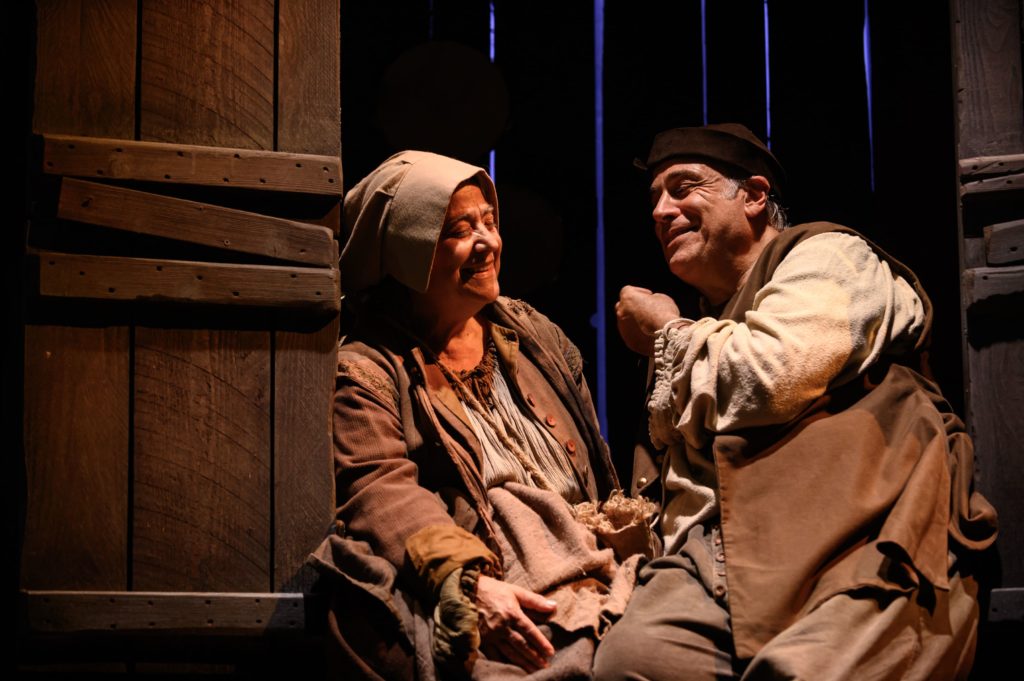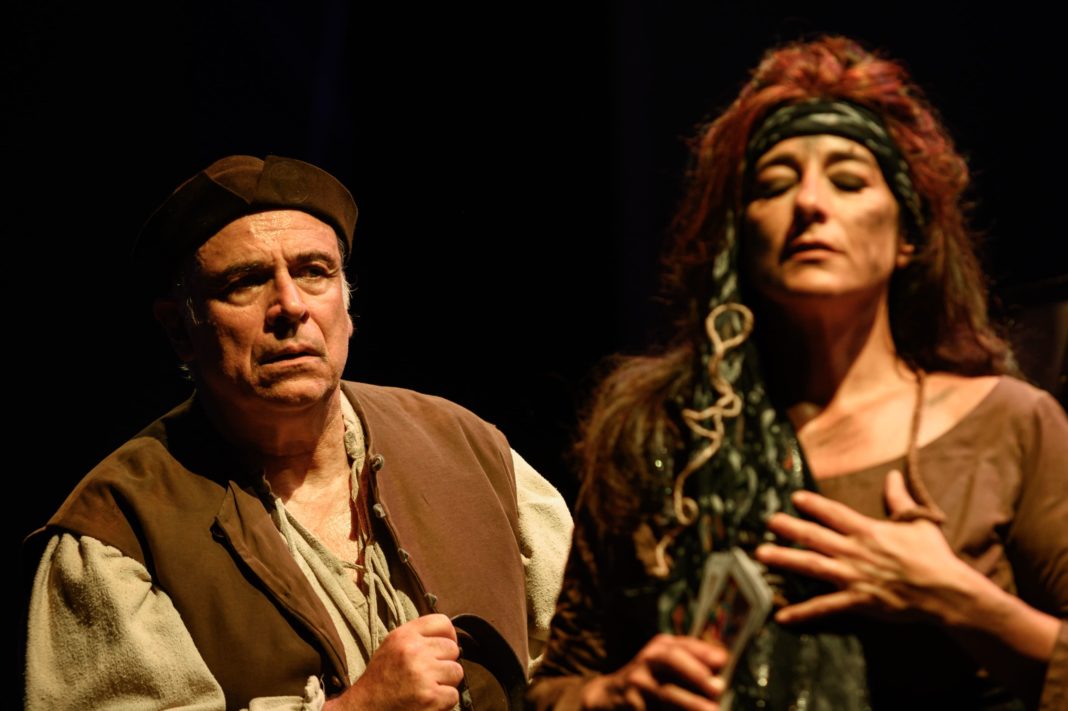Molière al Campania teatro Festival. Ma non c’è solo lui nello spettacolo L’avaro immaginario diretto e interpretato dall’attore napoletano Enzo Decaro che sarà in scena, in prima nazionale, venerdì 30 giugno, alle 20,30, sul palco grande della Villa La Floridiana.
L’adattamento fonde due classici francesi del seicentesco commediografo Jean-Baptiste Poquelin, in arte Molière (L’avaro e il malato immaginario) in una produzione de I due della città del sole: Decaro fa girare all’indietro la ruota del tempo e trasferisce il pubblico nel diciassettesimo secolo, accarezzandolo con inserti del teatro napoletano dei De Filippo.
Sette quadri, un prologo e un epilogo in un atto unico, che offrono uno spaccato di un periodo caratterizzato da guerre, epidemie, grandi tragedie, ma anche attraversato da profonde intuizioni e illuminazioni che riportano all’oggi. Tutto è finto a teatro, ma nulla è falso.
Spiega Decaro: «Il progetto nasce soprattutto da una curiosità ‘artistica’, a sua volta originata dalla constatazione che, a un certo punto della loro carriera, i De Filippo (Peppino e Luigi in particolare) hanno sentito l’esigenza di confrontarsi con il teatro di Molière e il suo genio innovativo, rimasto forse nel suo genere ancor oggi ineguagliato e vivissimo. A riprova, il fatto che, dopo oltre quattro secoli, in occasione della recente ricorrenza dalla nascita, si son tenute ovunque celebrazioni, studi e ricerche dedicate al suo teatro e alla sua mai tramontata “comédie humaine”. In particolare, “L’ avaro” e “Il malato immaginario” sono stati i due titoli a cui, una generazione dopo l’altra, i De Filippo, padre e figlio, hanno dedicato seppur con differenti approcci la loro attenzione, sia teatrale che umana».
“L’avaro immaginario” racconta il viaggio, reale e immaginario, di Oreste Bruno, da Nola, e i suoi famigliari, ovvero della tipica “carretta dei comici” tanto cara a Peppino e al figlio Luigi De Filippo.
Sono diretti a Parigi: un tragitto che è una fuga ma anche l’avvicinamento al teatro di Molière. Scappano dall’epidemia ma si tuffano anche nella speranza di un’avventura. Lungo il percorso, quando arrivano nei pressi di un centro abitato, di un mercato o di un assembramento di persone, ecco che il “carretto viaggiante” diventa palcoscenico e “si fa il Teatro”. E col “teatro” si riesce anche a mangiare, quasi sempre.
Grazie a stratagemmi, la famiglia ottiene il pasto quotidiano o qualche misera offerta in monete o, più spesso, qualche pezzo di animale già cucinato offerto come compenso della esibizione sul palco-carretto.
Affiancano Decaro, Nunzia Schiano e sei attori della compagnia Luigi De Filippo (Luigi Bignone, Carlo Di Maio, Massimo Pagano, Giorgio Pinto, Fabiana Russo, Ingrid Sansone). Le musiche sono di Nino Rota, tratte da “Le Molière immaginarie”, mentre quelle di scena si ispirano a villanelle e a canzoni popolari del seicento napoletano.

Campania Teatro Festival/ Enzo Decaro: “Here is my imaginary miser: Molière meets the humanity of Peppino and Luigi De Filippo”
Molière at the Campania teatro Festival. But there is more than just him in the play The Imaginary Miser directed and performed by Neapolitan actor Enzo Decaro, which will be staged, in its national premiere, on Friday, June 30, at 8:30 p.m., on the Villa La Floridiana’s big stage.
The adaptation merges two French classics from 17th-century comedian Jean-Baptiste Poquelin, aka Molière (The Miser and The Imaginary Sick Man) in a production of The Two of the City of the Sun: Decaro turns the wheel of time backward and transfers the audience to the 17th century, caressing them with inserts from the Neapolitan theater of De Filippo.
Seven pictures, a one-act prologue and epilogue, offer a glimpse of a period characterized by wars, epidemics, great tragedies, but also traversed by profound insights and illuminations that bring us back to today. Everything is fiction in the theater, but nothing is fake.
Explains Decaro: “The project was born above all from an ‘artistic’ curiosity, originated from the realization that, at a certain point in their careers, the De Filippo family (Peppino and Luigi in particular) felt the need to deal with the theater of Molière and his innovative genius, which has remained perhaps in its genre still unmatched and very much alive today. Evidence of this is the fact that, after more than four centuries, on the recent anniversary of his birth, celebrations, studies and research dedicated to his theater and his never-fading “comédie humaine” have been held everywhere. In particular, “L’ avaro” and “Il malato immaginario” have been the two titles to which, generation after generation, the De Filippo family, father and son, have dedicated their attention, albeit with different approaches, both theatrical and human.”
“The imaginary miser” recounts the journey, real and imaginary, of Oreste Bruno, from Nola, and his family members, that is, of the typical “carretta dei comici” so dear to Peppino and his son Luigi De Filippo.
They are headed to Paris: a journey that is an escape but also an approach to Molière’s theater. They flee the epidemic but also dive into the hope of adventure. Along the way, when they arrive near a town, a market or a gathering of people, that’s when the “traveling cart” becomes a stage and “theater is made.” And with “theater” you also manage to eat, almost always.
Thanks to stratagems, the family gets the daily meal or some paltry coin donation or, more often, a few pieces of already cooked animal offered as compensation for the performance on the stage-cart.
Joining Decaro are Nunzia Schiano and six actors from the Luigi De Filippo company (Luigi Bignone, Carlo Di Maio, Massimo Pagano, Giorgio Pinto, Fabiana Russo, Ingrid Sansone). The music is by Nino Rota, taken from “Le Molière immaginarie,” while the stage music is inspired by villanelle and popular songs from 17th-century Naples.
Enzo Decaro e Ingrid Sansone_L’AvaroImmaginario_Ph_GuglielmoVerrienti_3915 (3).jpg










